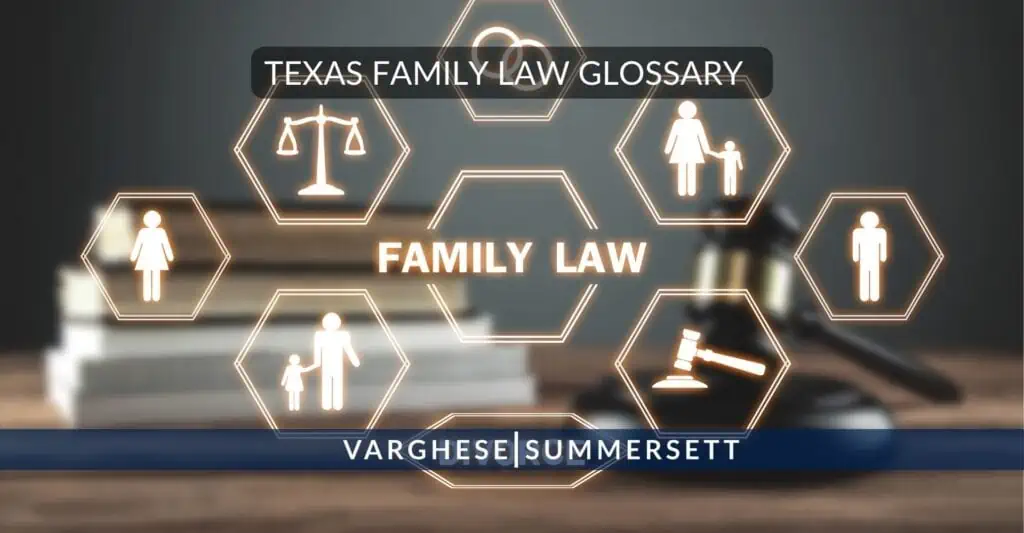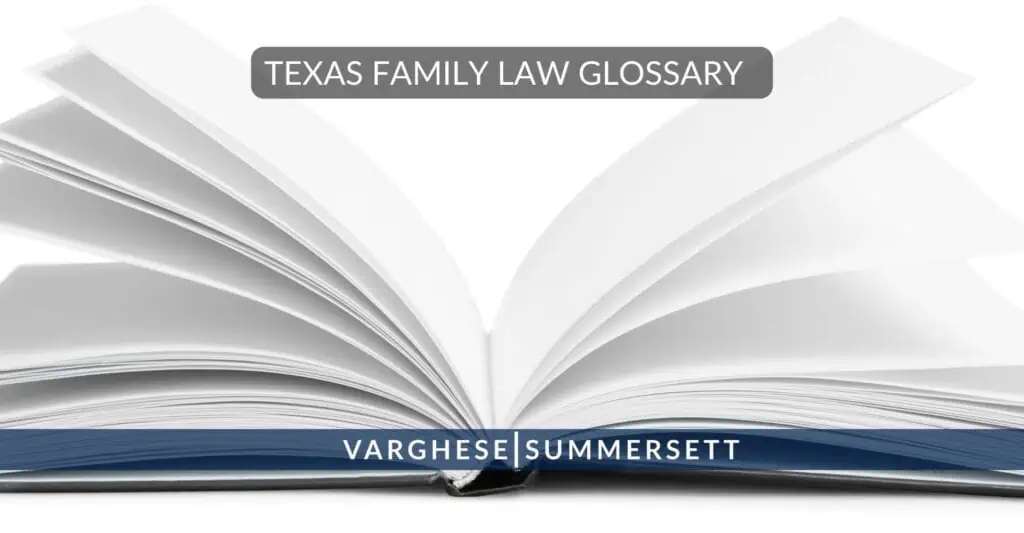If you are going through a divorce or family law case in Texas, you will likely hear many legal terms and phrases that are unfamiliar to you. To help you better understand the terminology, we have compiled this Texas family law glossary.
Texas Family Law Glossary
Admissable Evidence
Evidence or testimony that is allowed to be presented in a court.
Attorney Ad Litem
A lawyer appointed by the court to represent the interests of a minor in legal proceedings, ensuring their rights and preferences are considered in decisions affecting them.
Admissable Evidence
Evidence or testimony that is allowed to be presented in a court.
Alternative Dispute Resolution (ADR)
Methods used to resolve legal disputes outside of the traditional court setting, such as mediation, arbitration or negotiation.
Alimony
Referred to as “spousal maintenance” in Texas, this is financial support paid by one spouse to the other after a divorce.
Annulment?
A legal declaration that a marriage is null and void, as if it never occurred, due to certain conditions existing at the time of the marriage.
Written Answer
A formal written response to a lawsuit filed by the respondent (the party being sued) to the petitioner’s (the party initiating the suit) allegations, filed with the court within a specified time frame.
Arrears
Past-due or unpaid child support, alimony, or other financial obligations.
Best Interest of the Child
This is the standard that Texas courts use to decide issues involving children, such as custody, and visitation. It focuses on the safety of the child and their emotional and physical needs now and in the future.
Child Custody
Legally referred to as “conservatorship,” child custody refers to the court’s determination of who has the legal right to make decisions about a child’s life, including where they live, go to school, and receive healthcare.

Child Support Guidelines
A set of rules and calculations used to determine the amount of child support a parent must pay, based on factors such as income and number of children.
Common Law Marriage
A marriage recognized in the eyes of the law, even though no formal marriage ceremony has occurred. In Texas, a common law marriage is established when the parties live together as husband and wife and hold themselves out to others as married.
Community Property
A principle in Texas law where most property and debts acquired by either spouse during the marriage are considered jointly owned and are subject to division upon divorce or annulment.
Contempt of Court
A legal finding that someone has disobeyed a court order or has shown disrespect to the court process, potentially leading to penalties such as fines or jail time.
Conservatorship
The legal term in Texas for custody of a child. It can be “joint managing conservatorship (JMC), also referred to as joining custody; “sole managing conservatorship (SMC), also referred to as sole custody; or possessory conservatorship, often referred to as visitation.
Custodial Parent
The parent with whom the child primarily resides. The other parent is called the non-custodial parent.
Discovery
The pre-trial process where each party can obtain information and evidence from the other party through various means, including requests for documents, depositions, and interrogatories.
Divorce
The legal dissolution, or termination, of a marriage.
Divorce Decree
The final court order that officially ends the marriage and outlines the terms of the divorce, including property division, custody, and support.
Evidence
Documents, testimony or information that can be presented in court to prove or disprove a claim or allegations.
Family Law
The branch of law that deals with issues related to families and domestic relationships, including divorce, child custody, and adoption.
Enforcement
Legal actions taken to compel a party to comply with a court order. Noncompliance penalties could include fines, jail time, or loss of certain rights.
Garnishment
A legal process where a portion of an individual’s wages or assets are withheld to satisfy a debt or obligation. In family law, this often applies to child support or spousal support.
Grounds for Divorce
Legal reasons specified by Texas law for dissolving a marriage, including adultery, cruelty, abandonment, felony conviction, abandonment, confinement in a mental hospital, or living apart for at least three years. Texas is a no-fault divorce state, however, which means you don’t have to show the other party did anything wrong to get a divorce.
Guardian Ad Litem
A court-appointed advocate who represents the best interests of a child, such as custody disputes or when child welfare is a concern.
Impeachment
The process of challenging the credibility or truthfulness of a witness’s testimony in court, often through prior inconsistent statements or conflicting evidence.
In Camera
When a judge hears evidence or testimony in private, outside of the presence of jurors and the public. This may occur to protect sensitive information or when minors are involved.
Insupportability
The most common ground for divorce in Texas, where the marriage is declared “insupportable” due to discord or conflict that has destroyed the legitimate ends of the marital relationship.
Interrogatories
Written questions served on the opposing party during the discovery process, which must be answered under oath within a specific time frame.

Joint Custody
Referred to as “joint managing conservatorship,” this is when both parents share responsibilities and decision-making related to the child.
Jurisdiction
Authority of a court to hear and decide legal matters within a specific geographic area or over certain types of cases
Mediation
A form of alternative dispute resolution where a neutral third party, the mediator, works with both parties to help them reach a mutually acceptable agreement.
Mediated Settlement Agreement (MSA)
A written agreement between parties that resolves the issues in a divorce or other family law matter outside of court. Once signed, it is typically incorporated into the final divorce decree.
Modification
The process of changing or altering an existing court order, such as custody or support, due to a significant change in circumstances.
Motion
A formal request for a specific ruling or action filed with the court during a case.
Negotiation
The process of discussing and coming to an agreement on terms without involving a judge or other legal authority.
No-Fault Divorce
Texas is a no-fault divorce state, which means one spouse does not have to show the other spouse did anything wrong. They can just cite, “insupportability” due to discord or conflict.
Court Order
A ruling or decision made by a judge in court that has the force of law and must be obeyed.
Paralegal
A legal assistant who works under the supervision of an attorney, performing tasks such as research, document preparation, and client communication
Parenting Plan
A written agreement or court order that outlines the schedule and responsibilities for each parent in regards to the care, decision-making, and support of their child.
Paternity
The legal determination of a child’s biological father, often an issue in child support and custody cases.
Prenuptial Agreement
A contract entered into before marriage that outlines the division of assets and financial arrangements in the event of a divorce.
Petition
A formal written request for legal action, filed with the court, that outlines the party’s claims and requests for relief.
Pleadings
Written documents filed with the court by each party in a case, stating their respective positions and arguments.
Pre-Trial
The period before a trial where parties may engage in discovery, negotiations, and hearings in preparation for trial.
Property Division
The process of dividing assets and debts between divorcing spouses. Texas follows community property laws, which means any property acquired during the marriage is considered equally owned by both parties.
Prove-Up Hearing
A brief court hearing where the parties present evidence and testimony to support their divorce agreement, typically used when there are no contested issues.
Qualified Domestic Relations Order (QDRO)
A court order that outlines how retirement benefits will be divided between spouses following a divorce.
Restraining Order
The party who responds to a petition or complaint in a legal action, typically the defendant in a divorce.
Separate Property
Property owned by one spouse individually and not subject to division in a divorce. This includes property owned before marriage and gifts or inheritances received by one spouse during the marriage.
Service of Process
The official delivery of legal documents to notify a person they are being sued and provide them with an opportunity to respond.
Settlement Agreement
A written agreement between parties that resolves disputes and avoids the need for litigation.
Sole Managing Conservatorship
When one parent has the exclusive right to make decisions and possess the child, while the other parent may have limited rights and access.
Standard Possession Order (SPO)
A default possession schedule in Texas that outlines the time each parent spends with their child, typically including weekends, holidays, and summer vacation. Get the 2024 calendar here.
Subpoena
A court order requiring a person to appear as a witness or provide certain documents or evidence.
Temporary Orders
Orders issued by the court during the divorce process that outline the rights and duties of each party until the final decree is issued. For example, temporary orders may address child support, custody arrangements, and spousal support. These orders are meant to provide temporary stability until a final decision is made.
Termination of Parental Rights
A legal action that permanently ends a parent’s rights and responsibilities towards their child, often in cases of abuse or neglect.
Uncontested Divorce
When both parties agree to all terms of the divorce, such as property division, child custody, and support, and do not require court intervention for a resolution. This can save time and money compared to a contested divorce.
Venue
The specific geographic location where a court case may be heard.
Visitation
The time a non-custodial parent spends with their child, as outlined in a possession order or agreed upon by the parties. In Texas, this is often referred to as “possession and access.
We hope you found our Texas family law glossary helpful. This is not an exhaustive list but includes some key terms you’ll probably hear if you are going through a divorce, child custody dispute, or other family law matter. If you have any questions or need further clarification, the experienced team at Varghese Summersett Family Law Group can help. Call 817-203-2220.



